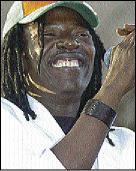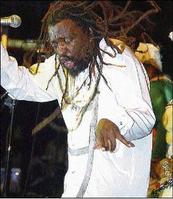William Asiedu, Contributor

Alpha Blondy in performance at Reggae Sunsplash 2006, World Beat night. - Ian Allen/Staff Photographer
HIP hop and reggae have exploded in Africa, giving the youth a voice to speak their minds.
Through the two music genres, singers have, on behalf of the youth, confronted their governments and leaders over very sensitive social and political matters.
This is happening on a continent where young people do not have the right to talk bluntly about issues and concerns.
The hip hop and reggae waves are getting hot, and reports from various parts of Africa indicate that young people are loving it, especially the urban youth who also see the lyrics of the songs as a mirror that reflects their lives.
Public enemy number one

South African reggae artiste Lucky Dube performs at Brand Trelawny One Love Concert held in Water Square, Falmouth, last year. Dube was killed in an attempted carjacking last October.
Popular Ivorian reggae star, Tiken Jah Fakoly, recently attacked Senegalese President, Abdulai Wade, so hard during a performance at Senegal's Hip Hop Awards that he has found himself to be public enemy number one.
The Minister of Internal Affairs reportedly ordered him out of the country, describing his statements about President Wade as 'sensational, insolent and discourteous'.
Reggae in Senegal has become very popular, with events such as the 'Riddim4children' reggae festival and the Djoloff Diop Reggae Festival.
The two most prominent African reggae singers, Alpha Blondy from Cote d'Ivoire (the Ivory Coast) and the late South African superstar, Lucky Dube, led the way in the '80s and '90s when they slammed political regimes that oppressed the people of Africa.
In 1986, Alpha blasted the South African government, describing apartheid as Nazism. That was historic for him as a musician and for Africa, as it turned attention to the rot in South Africa. Not long after the record's release, apartheid began to crumble.
Lately in Africa, roots reggae, Bob Marley style, seems to be giving way to the rap/reggae fusion-ragga.
Ragga in Africa is usually a mixture of the official languages, English, French, Portuguese or Spanish and local dialects rapped on typical Jamaican beats. It is also quite popular in Ghana where ragga artiste, Samini, recently picked up a MOBO award for Best African Act.
Unlike the roots reggae singers on the continent who are quite political and philosophical in their lyrics, the ragga singers tend to sing more about women and love.
On the flip side, hip hop is also kicking in Africa where artistes also rap in English, French, Spanish, Portuguese and local dialects, over typical American hip hop rhythms.
Almost all parts of the continent, including the conservative Muslim north, have caught the hip hop fever.
Groups and individual rappers like Red One from Morocco, Skyhigh Family (Somalia), MTM (Egypt), K'naan (Somalia) and the Sudanese Emmanuel Jal are enjoying a massive following in North Africa.
Hip hop songs devoid of sex and swear words are quite popular in some North African countries, where some youth now prefer XXL T-shirts and baggy jeans to the traditional flowing smock.
In East Africa (Tanzania), hip hop is variously known as bongo flava, in West Africa (Ghana) it is called hiplife, South Africans refer to their brand of hip hop as kwaito.
In West Africa, Ghana, Nigeria and Senegal seem to be leading the hip hop movement with a long list of singers and a huge following.
Hiplife
In the '90s, singer and dancer Reggie Rockstone popularised hip hop in Ghana when he introduced what he called hiplife - a blend of Ghanaian highlife music (guitar-based music) and rap, which is done in English and local languages. Today it is the most popular music form in Ghana.
About 60 per cent of all songs on music charts around the country feature hiplife.
Hip hop in West Africa largely talks about women, sex and love but recently some artistes in Ghana and Nigeria have used hip hop to raise political questions.
Ghana's A-plaz and Sidney, aka Barimah, have released new albums that criticise Ghanaian and African political leaders for squandering the continent's wealth.
Other popular Ghanaian rappers include Lord Kenya, Obour, VIP, Obrafuor, Castro Destroyer, MzBel and Tinny who are less political but are also well known in West Africa.
In South Africa, hip hop started with Black Noise, a group from Cape Town. The government during South Africa's apartheid era tried to ban rap due to its part in the struggle for the freedom of all races but later relented.
To prove how far things have some, South African hip hop star Zola - who has also made his name as an actor - was recently named as a regional Goodwill Ambassador to UNICEF.
The hip hop culture has not only influenced the music of Africa but indeed changed the face of fashion in many parts of the continent where young people now try to dress like their hip hop idols.
Many young people have swapped their indigenous African clothes, like the agbada, fugu, (smocks) kaba and slit (long skirt and top dress designed with African wax print) for hip hop's mini skirts, strapless blouses, huge T-shirts, and baggy trousers.
Young African men are now plaiting their hair and wearing ear-rings, a trend that could not be thought of before hip hop rocked Africa about two decades ago.
Even the way the youth speak in Africa now seems to be changing as they try to slang like the rappers do.
On one hand, hip hop has given the youth some confidence to talk about their lives, while on the other, it has presented to the African images of nice cars, beautiful, expensive jewellery, huge mansions and plenty of sex, drugs and alcohol as symbols of good life.
Many more young Africans are chasing these things in order to be part of the flowery hip hop culture. And that rush continually creates problems for them.
With just a small community of renowned African rap artistes on the international stage, Akon and Chamillionaire, to name just two, who were the children of African immigrants to the US, they hold high the hip hop flag of Africa on the world scene.
'Generals'
On the continent, generals in the 'African hip hop army' include MC Delicate from Kenya, Property of Africa (Zimbabwe), Toxic Man (Nigeria), Stagga (Botswana) Professor Jay (Tanzania), DJ Cavera C (Angola) and Alif from Senegal.
Others are Baseball Track (Mozambique), Boyz of Budumburam (Liberia), Reggie Rockstone (Ghana), Kaysha (Democratic Republic of the Congo), Kill Point (Guinea), Le Specialist (Madagascar) and M.A.M. (Cote d'Ivoire). In Africa, you can also hear hip hop sounds from Mapenza (Rwanda), Negro Force (Togo), The Postmen (Cape Verde), Raggazone (Benin), Rage (Mali) and U.M.A.R. from Cameroon.
Senegalese singer Faada Freddy aptly described the wave of hip hop in Africa: "Hip hop was born in Africa, went around the world and is back to Africa, like a boomerang that had been thrown from the motherland, it is back home."

